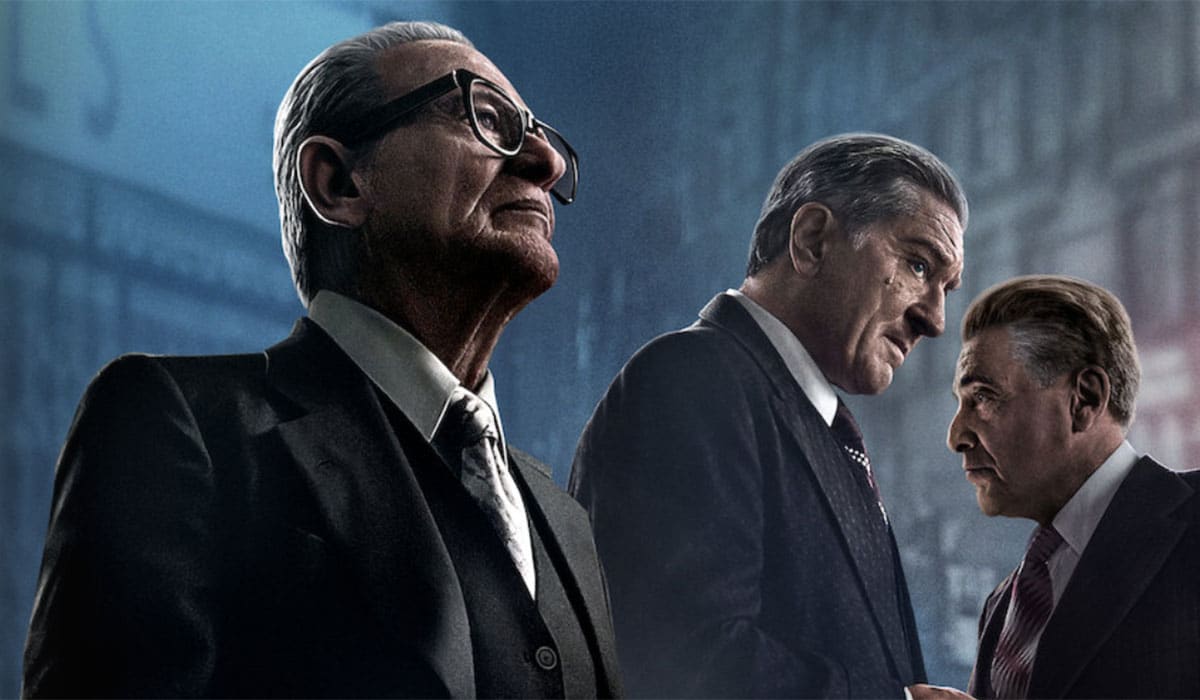Cinema is a continually evolving art form, with many young and innovative creators producing work of extraordinary calibre. However, The Irishman represents an Old Master of the medium reaching back and drawing upon the sketches and models he produced long ago to produce a new masterpiece. The result is a beautifully haunting film from Martin Scorsese that blends his differing modes of expression from across his long career. Although the film takes time to build momentum, when it does, it drives itself directly into your own sense of mortality, divided loyalties, and moral legacy.
Robert De Niro portrays Frank ‘The Irishman’ Sheeran, with a story adapted by Steven Zaillian from the book ‘I Heard You Paint Houses’ that chronicles the details of the real man’s life. The book’s title also appears as the on-screen one here, reflecting Scorsese’s fondness for it and its aptness as a euphemism for performing mob hits. The story takes place across many decades, tracking the path of Frank’s life as he negotiates his relationships with his family, the Bufalino crime family, and his longtime friendship with infamous union boss Jimmy Hoffa (Al Pacino).
We begin with a young Frank meeting and befriending Russell Bufalino (Joe Pesci), with his side-work for the mob catching the eye of Angelo Bruno (Harvey Keitel, in a sparse but menacingly pitched role). Frank begins climbing the ranks, doing work for union boss Jimmy Hoffa, who – in contrast to Bufalino – wins the affection of Frank’s daughter Peggy (Lucy Gallina, then Anna Paquin as an adult). As the years pass the characters’ objectives become misaligned, and Frank’s loyalties become increasingly divided, as he is faced with a reckoning.
The film contains many references to Scorsese’s most famous works – for instance, there is more than one long take in the vein of the famous Copacabana tracking shot from Goodfellas. As a result of this, as well as the gangster-adjacent plotline, The Irishman alludes to the high-octane, violent, testosterone-fueled criminal hijinks of the likes of Goodfellas and Casino, but is less directly concerned with them. The explosive violence is here, although there is less shouting about shine boxes preceding it and more thoughtful pauses, the building of tension, and talk of “demonstrating a failure to show appreciation.”
The same gangster code and sharp-witted interactions are present, and they underscore every character interaction in the story. The spiritual rot that sets in, however, is played out in full here and depicted by Robert De Niro’s best performance in recent memory. In terms of tone and pace, the film feels more at peace developing intertextuality with Silence and The Last Temptation of Christ. As Frank fails to summon up remorse for some of his acts, when he is old, rejected, and fading away in a nursing home, the film communicates a form of spiritual numbness and unavowed apostasy. What use is a code of honour if you have no moral code? If loyalties shift in indistinct ways and your morals are pliable, can you face the spiritual chasm you might open up within you?
The film is a masterful piece of cinematic craft from not only Scorsese, but also his longtime editor Thelma Schoonmaker. The film’s length is rarely felt after a very measured opening, and the primary reason is Schoonmaker’s work. Scenes are paced to perfection, and the character interactions and dynamics are given the time to fully inhabit the screen as much as the actors do in their individual roles.
The only true criticism is the characters never quite sell their younger selves in physicality. Much has been made of the de-aging technology applied to the key leads, and it mostly works superbly. As good as the visual effects are, the major players still carry themselves and move like men in their late seventies. When Frank beats up a greengrocer, it’s the restrained violence of the slightly arthritic. Given the fragmented, lucid dream-feeling structure of the narrative, however, this proves little hindrance to the suspension of disbelief.
Like De Niro, Al Pacino delivers a late-career highlight that showcases his best and forgotten skills. He plays Hoffa as a character with a calm, arrogant pragmatism. He has his signature moments of loquacious indignation, but they are sparing and dialed back to the more character-defining, less showy anger of his early career. Joe Pesci also plays interestingly against type; all his work is based in quiet malevolence and foreboding sunglassed stares. The ensemble cast is terrific, with a special mention to Anna Paquin excelling without much dialogue in a small but pivotal role. Her piercing glares and avoidance of her father is a silence that speaks volumes, and she embodies the tangible and human side of what Frank has willingly sacrificed..
In The Irishman, Scorsese’s gangster icons meet the more existentialist concerns of some of his other filmography entries. The film and the performances speak to a deep and mortal sense of legacy and suggest people are the sum of their actions. If those actions produce nothing as a legacy, beyond a hollow code you are too proud to break, was it worth the emotional toll exacted by them? Over the course of the film, a fascination with Frank’s work gives way to an overwhelming sense of the sad futility of his actions, and the great spiritual cost to the self of ‘painting houses’.
Some of the coverage you find on Cultured Vultures contains affiliate links, which provide us with small commissions based on purchases made from visiting our site.

